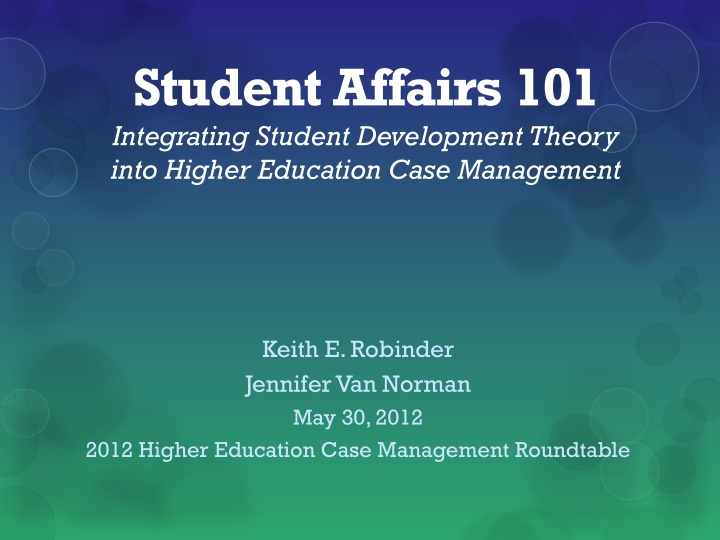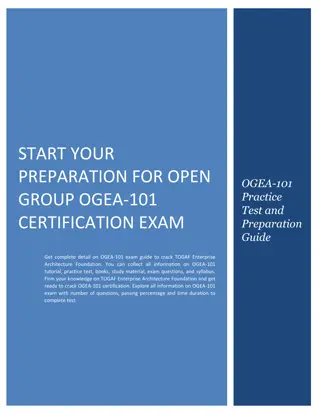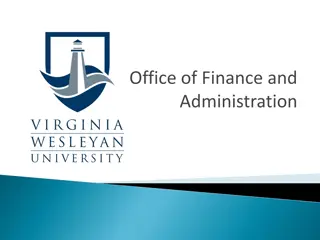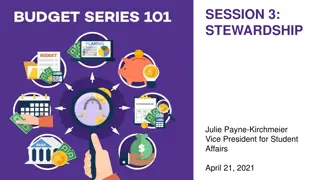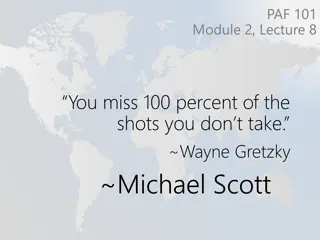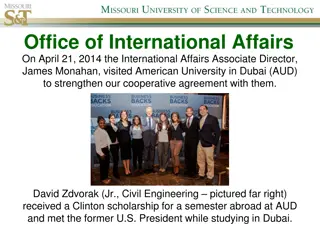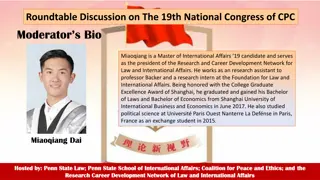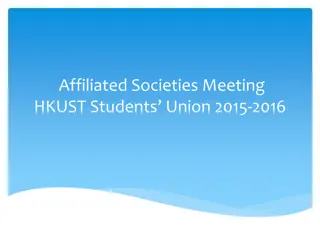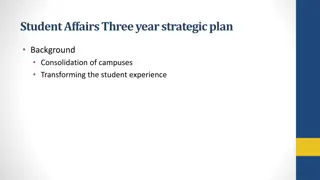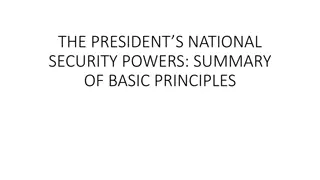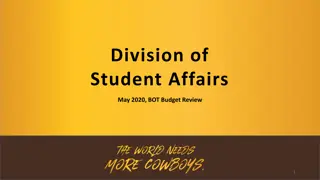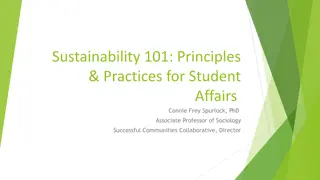Student Affairs 101
This presentation explores the integration of student development theory into case management in higher education, covering topics like student affairs philosophy, historical movements influencing student development, recent trends in student affairs practice, and the definition of student development by various scholars. It emphasizes the importance of focusing on the whole student, social justice, inclusion, balance, challenge, support, and prioritizing the academic mission.
Download Presentation

Please find below an Image/Link to download the presentation.
The content on the website is provided AS IS for your information and personal use only. It may not be sold, licensed, or shared on other websites without obtaining consent from the author.If you encounter any issues during the download, it is possible that the publisher has removed the file from their server.
You are allowed to download the files provided on this website for personal or commercial use, subject to the condition that they are used lawfully. All files are the property of their respective owners.
The content on the website is provided AS IS for your information and personal use only. It may not be sold, licensed, or shared on other websites without obtaining consent from the author.
E N D
Presentation Transcript
Student Affairs 101 Integrating Student Development Theory into Higher Education Case Management Keith E. Robinder Jennifer Van Norman May 30, 2012 2012 Higher Education Case Management Roundtable
Student Affairs 101: Integrating Student Development Theory into Case Management Overview of Presentation Learning Outcomes Student Affairs Philosophy Student Development Theories Case Study Discussions Implications for Case Management Practitioners Questions
Student Affairs 101: Integrating Student Development Theory into Case Management Student Affairs Philosophy 1) The Guidance Movement of the 1920 s 2) The Student Personnel Point of View 1937 & 1949 The personal and professional development of students were prioritized in higher education (in addition to research and scholarship). Educators must guide the whole student to reach his or her full potential. 3) The Civil Rights and Women s Movements 1960 s Diversified student body requires additional perspectives.
Student Affairs 101: Integrating Student Development Theory into Case Management Student Affairs Philosophy 4) Nevitt Sanford (1962) Cycles of Differentiation and Integration Balancing Challenge and Support 5) Emergence of Student Development Theory 6) More recent trends in Student Affairs practice The Student Learning Imperative (1996) Learning Reconsidered (2004) Increasing focus on learning outcomes and assessment.
Student Affairs 101: Integrating Student Development Theory into Case Management Student Affairs Philosophy - Summary Focus on the whole student Social Justice and Inclusion Balance Challenge and Support Prioritize the Academic Mission
Student Affairs 101: Integrating Student Development Theory into Case Management Student Development Defined What is student development ? Sanford (1967) defined development as the organization of increasing complexity (p. 47). Miller and Prince (1976) defined the student development as the application of human development concepts in postsecondary settings so that everyone involved can master increasingly complex developmental tasks, achieve self-direction, and become interdependent (p. 3). Rogers (1990) defined student development as the ways that a student grows, progresses, or increases his or her developmental capabilities as a result of enrollment in an institution of higher education (p. 27). Student Development is a philosophy that guides student affairs practice as a concern for the development of the whole person (Rogers, 1990, p. 27).
Student Affairs 101: Integrating Student Development Theory into Case Management Use of Student Development Theory Knowledge of student development theory enables student affairs professionals to identify and address student needs, design programs, develop policies, and create healthy college environments that encourage positive growth in students (Evans et al, 2010, p. 7).
Student Affairs 101: Integrating Student Development Theory into Case Management Student development theories respond to four key questions: 1. What interpersonal and intrapersonal changes occur while the student is in college? 2. What factors lead to this development? 3. What aspects of the college environment encourage or retard growth? 4. What developmental outcomes should we strive to achieve in college? (Knefelkamp et al, 1978)
Student Affairs 101: Integrating Student Development Theory into Case Management Key Student Development Theories Three foundational theories were introduced in the 1960 s building on the Erikson s ideas of identify development. 1) Chickering s Theory of Identity Development 2) Perry s Theory of Intellectual and Ethical Development 3) Kohlberg s Theory of Moral Development (Evans et al, 2010)
Student Affairs 101: Integrating Student Development Theory into Case Management Key Student Development Theories Chickering s Theory of Identity Development Seven Vectors: 1. Developing Competence 2. Managing Emotions 3. Moving Through Autonomy Toward Interdependence 4. Developing Mature Interpersonal Relationships 5. Establishing Identity 6. Developing Purpose 7. Developing Integrity (Chickering and Reisser, 1993)
Student Affairs 101: Integrating Student Development Theory into Case Management Key Student Development Theories Perry s Theory of Intellectual and Ethical Development Cognitive structures that shape how people view and make meaning of their experiences 1. Dualism 2. Multiplicity 3. Relativism 4. Commitment in Relativism (Perry, 1968)
Student Affairs 101: Integrating Student Development Theory into Case Management Key Student Development Theories Kohlberg s Theory of Moral Development Six Stages of Moral Reasoning: Preconventional: Avoidance of Punishment/Power of Authorities Pragmatic Self Interest in what is Fair Conventional: Social expectations and Approval Consistent rules that apply equally to all Principled: Fundamental Human Rights and V alues Universal Ethical Principles (process oriented) (Kohlberg, 1969)
Student Affairs 101: Integrating Student Development Theory into Case Management Other Student Development Theories 1. Baxter Magolda s Theory of Self Authorship (2004) 2. Social Identity Theories: e.g. Racial, Ethnic, Sexual ,and Gender Identities 3. Adult Learning Theories 4. Campus Environment/Ecology Models Involvement Theory Alexander Astin (1984) Schlossberg s Continuum of Community (1989) Tinto s Theory of Departure (1987)
Student Affairs 101: Integrating Student Development Theory into Case Management Case Study Discussion #1 Keisha Sullivan, an eighteen year old first year student, includes vivid descriptions of self- mutilation in an academic writing assignment. Two weeks later, Keisha faints in the Memorial Union in between classes. She refuses medical assistance. That night, Keisha discloses thoughts of suicide to her Residence Hall Community Advisor. She is transported to the local hospital for evaluation.
Student Affairs 101: Integrating Student Development Theory into Case Management Case Study Discussion #2 Jack Rivera, a twenty four year old sophomore, is involved in an overly aggressive confrontation with the custodial staff in the Library. Campus Police respond. Later, Jack talks about the incident with his academic advisor. He discloses he feels under immense pressure to maintain his grades so he isn t dismissed from ISU. He shares he isn t doing well with the stress and thinks a lot about hurting himself and others. The next week, Jack has an emotional breakdown in class after receiving a failing grade. He tells the instructor, This was my last chance, someone is going to die.
Student Affairs 101: Integrating Student Development Theory into Case Management Implications for Higher Education Case Managers Emerging focus on Mental Health issues Collaboration with academic faculty Continuing focus on the whole student Providing challenge and support Balancing individual and community perspectives
Student Affairs 101: Integrating Student Development Theory into Case Management Questions?
References Astin, A. W. (1984). Student Involvement: A developmental theory for higher education. Journal of College Student Development, 25, 297-308. Baxter Magolda, M. B. (2004). Self-authorship as the common goal of 21stcentury education. In M. Baxter Magolda & P. M. Kings( Eds.), Learning partnerships: Theories and mods of practice to educate for self-authorship (pp. 1-35). Sterling, VA: Stylus. Chickering, A. W. & Reisser, L. (1993). Education and identity (2nded.). San Francisco: Jossey-Bass. Evans, N. J., Forney, D. S, Guido, F. M., Patton, L. D. & Renn, K.A. (2010). Student Development in College: Theory, research and practice (2ndEd.). San Francisco: Jossey-Bass. Knefelkamp, L.L., Parker, C. A., & Widick, C. (1978). Applying new developmental findings. New Directions for Student Services, No. 4. San Francisco: Jossey-Bass. Kohlber, L. (1969). Stage and sequence: The cognitive developmental approach to socialization. In D. A. Goslin (Ed.), Handbook of socialization theory and research (pp. 347-480). Skokie, IL: Rand McNally. Miller, T. K. & Prince, J. S. (1976). The future of student affairs: A guide to student development for tomorrow s higher education. San Francisco: Jossey-Bass. Perry, W. G. (1968). Forms of intellectual and ethical development in the college years: A scheme. New York: Holt, Rinehart, & Winston. Rogers, R. F. (1990). Student Development. In U. Delworth, G. R. Hanson, & Associates, Student Services: A Handbook for the profession (2nded., pp. 117-164). San Francisco: Jossey-Bass. Sanford, N. (1962). Developmental status of the entering freshman. In N. Sanford (Ed.),The American college student (pp. 253-282). Hoboken, NJ: Wiley. Sanford, N. (1967). Where colleges fail: The study of the student as a person. San Francisco: Jossey-Bass. Schlossberg, N. K. (1989). Marginality and mattering: Key issues in the building community. In D. C. Roberts (Ed.), Designing campus activities to foster a sense of community (pp. 5- 15). New Directions for Student Services, no. 48. San Francisco: Jossey-Bass. Tinto, V. (1987). Leaving College: Rethinking the causes and cures of student attrition. Chicago, IL: University of Chicago Press.
